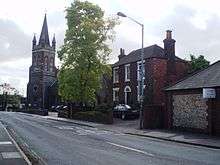Wilfred Brown
| Wilfred Brown | |
|---|---|
| Birth name | Wilfred Brown |
| Born |
5 April 1921[1] Horsham, West Sussex UK |
| Died |
5 March 1971 (age 49) Petersfield, England, UK |
| Occupation(s) | Singer |

Wilfred Brown (5 April 1921 – 5 March 1971) was an accomplished English tenor.[2]
He was born in Horsham, Sussex and educated first at Collyer's School, then at Christ's Hospital School, Horsham before winning a scholarship in 1939 to Sidney Sussex College, Cambridge. Brown was a lifelong member of the Religious Society of Friends. After war-time service with the Friends Relief Service he returned to Cambridge and graduated in 1947. He then moved to University College School, Hampstead where he taught German and French. He left two years later to teach at Bedales School, where he was form master of amongst others Gerald Finzi's two sons [3] before becoming a full-time singer in 1951.
Like fellow Petersfield resident Michael John Hurd, he championed the work of Gerald Finzi, who was a friend. He first sang Finzi's Dies natalis in 1952 under the composer's baton,[3] and was to become Finzi's favoured soloist in several subsequent performances of the work.[4] Brown also gave the first performance of Till Earth Outwears, a posthumous collection of Finzi's settings of poems by Thomas Hardy, in 1957 at Ashmansworth.[5] In 1958, he was co-dedicatee and original performer with the oboist Janet Craxton of Ralph Vaughan Williams' song cycle Ten Blake Songs.[6] In 1963 he recorded what is often cited as the definitive performance of Dies Natalis with the English Chamber Orchestra, under the direction of the composer's son, Christopher Finzi.[7]
He was also a great friend of the guitarist John Williams and together they recorded an album of music by Benjamin Britten, Stephen Dodgson and John Dowland (released in 1969 on Columbia Odyssey),[8] and a collection of English folk songs.[9]
Brown died in Petersfield from a brain tumour on 5 March 1971, aged 49.[10] In his last recital, given at Highclere Castle in Hampshire, he had sung Dies Natalis.[11]
Notes
- ↑ "Brown, Wilfred, 1921–1971". Library of Congress.
- ↑ New Grove Encyclopaedia of Music (2005)
- 1 2 McVeagh, Diana. Gerald Finzi: His Life and Music. Boydell Press, 2005: p. 207
- ↑ McVeagh, Diana. "A Finzi Discography", Tempo, New Series, No. 136. (Mar., 1981), pp. 19-22,
- ↑ McVeagh (2005): p. 253
- ↑ Satola, Mark. Ralph Vaughan Williams: Blake Songs (10) for voice & oboe at AllMusic. Retrieved 20 May 2015.
- ↑ Tempo, New Ser., No. 45. (Autumn, 1957), pp. 1-4
- ↑ Songs for Voice and Guitar.
- ↑ Belart 461 4892 released 1998 CD
- ↑ Obituary by John Stevens in The Musical Times, Vol. 112, No. 1539. (May, 1971), p. 478,
- ↑ Sleeve notes from Wilfred Brown and John Williams: Folk songs (Belart 461 4892, released 1998), John T. Hughes